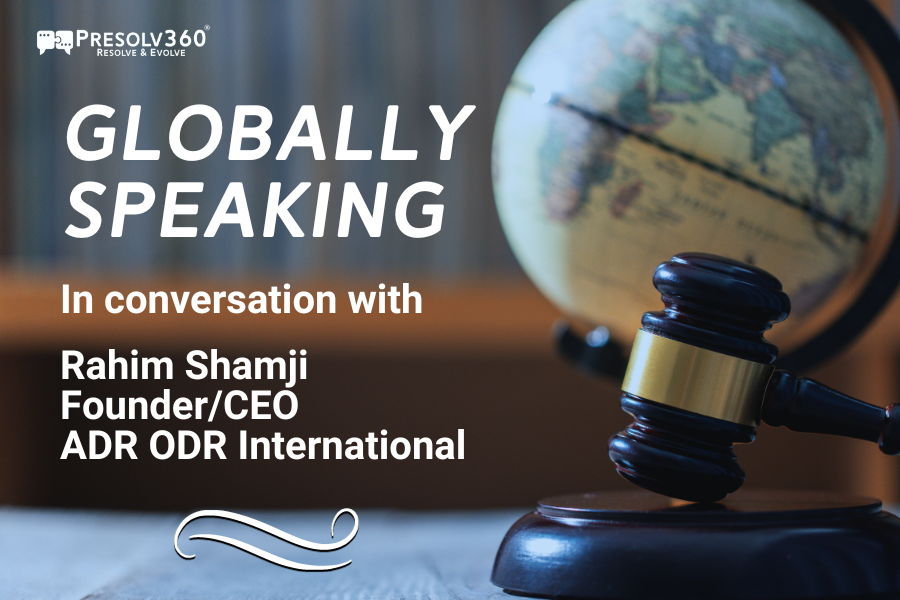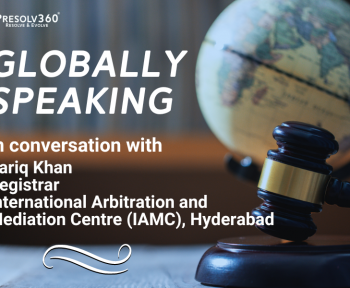A recent report by Goldman Sachs sent shockwaves through the legal world. It predicted that generative AI could automate 44% of the workforce in the legal industry. This raises several questions. What does the future of dispute resolution look like? Where do today’s law students fit in this future? How can one shape their legal career with technology and AI hovering over everything they do?
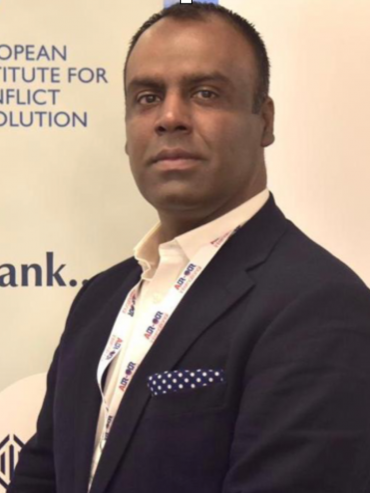
To find answers to these and many more important questions, we spoke to Rahim Shamji. Barrister-turned-peacemaker Shamji is the Founder and CEO of ADR ODR International, a global organization for progressive dispute resolution and training. He is also the Director of THAC Academy at the Thailand Arbitration Centre and the LLM Course Convenor for ADR – Theory and Context at Queen Mary University of London. He also serves as the Global Advisor and International Faculty to the Ismaili Conciliation and Arbitration Board.
Shamji has been mediating since 2005 and has a wide civil/commercial practice where he has undertaken over 500 cases. He attended the Harvard Program for Negotiation in 2014 and regularly undertakes complex multi-disciplinary and multi-party cases. His company ADR ODR International is a prevalent driver of revolution in the world of Online Dispute Resolution (ODR).
Shamji spoke in a free-wheeling discussion about what’s coming in the world of dispute resolution – and how to embrace it.
This interview has been edited for length and clarity.
How did you start your legal career? What led to your interest in alternate dispute resolution (ADR) and online dispute resolution (ODR)?
I went to Queen Mary University of London (QMUL) in 1995 to “read the law”. My undergraduate degree was for three years and initially, I did not know what I wanted to do. I thought the law was like what you see in an American TV drama. [laughs]
When you finish your law degree in the UK, you have to choose either the solicitor or the barrister route. A couple of internships made it clear that I wanted to be a barrister, not stuck behind a desk. I chose the Bar, and during my Bar studies, got into chambers and pupillage, crime, civil, and family law. In 2005, I embarked upon my Master’s in ADR and Islamic Law at SOAS. Eventually, I managed to get an invitation to Portugal to train as a mediator in a non-accredited programme.
That programme was a huge influence on me. Nobody had ever taught me about the power of dialogue for finding a solution, rather than fighting for a win. The lessons I learned were so powerful that I soon left chambers, becoming a tutor at BPP University. While teaching there, I pursued further studies in mediation, arbitration, and negotiation. I ultimately ended up attending Harvard Law School in the negotiation programme – a master class on negotiation.
My journey into ADR and ODR was quite deliberate. By 2015-2016, I had worked as a Director of Education for a UK-based mediation company for almost five years. My time with the company helped me realize certain limitations of being only a mediation provider. At the same time, I also faced a lot of resistance when I spoke to people about ODR. Nobody believed that platforms or networks could help resolve disputes in any meaningful way.
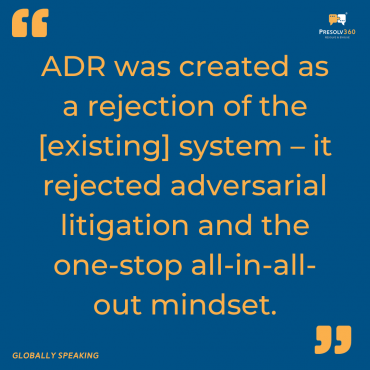
However, I was convinced. In 2016, I decided to jump ahead and create my organization. The first thing I ensured was that “ODR” was part of the title [laughs]. At the time, the world was moving towards wider adoption of ADR, but I also foresaw a shift to ODR. And everyone in the company had to focus on ODR. The only way to do that was to represent that focus in the title of the company itself.
What do you think has been the impact of ADR on traditional dispute resolution mechanisms globally? And given the increasing prominence of technology, how relevant and efficient is online dispute resolution?
ADR was created as a rejection of the [existing] system – it rejected adversarial litigation and the one-stop all-in-all-out mindset.
Today, the conversation in many parts of the world is around whether it is even appropriate to say ‘alternate’ dispute resolution. Many governments and countries have made mediation, negotiation, conciliation, and arbitration adjudication part of their legal landscape. ADR has become mainstream in many places.
In my view, the world is moving towards ADR because people have become less confrontational. In a world where we are so connected and interdependent, the newer generations – the Gen Z folks and the millennials – don’t see the world as a place where they must fight to get to the top. The general sentiment now is more about being egalitarian and giving enough choices to people.
In such an environment, mediation, arbitration, and ODR fit into people’s lives easily. We will increasingly see people looking at dispute resolution not as an endgame, but as a mechanism for everyday conflict management. You must learn to manage conflicts rather than just fix them.
I envision the future to be a lot more focused on day-to-day conflict and dispute management. Some disputes will be managed, some will be resolved, and some won’t – but that’s okay too.
That’s something to look forward to! But I’m curious – in your opinion, what are the worst and best parts about Online Dispute Resolution?
The problem with ODR, of course, is that it is dependent on technology and users. Any ODR mechanism needs correct working technology, as well as comfort and understanding of how to use it from all users. I remember one of my early online mediations, before the pandemic. It was a low-value dispute. The parties came online, but then their phones crashed. They ran out of data, there were no alternate phone numbers to dial in – it was ridiculous really.
Now, of course, post-COVID we are in a new, much more technologically blessed place. Users are aware of platforms like Zoom and how to use them, alternatives like WhatsApp Video, Messenger, etc. have become common, and even data has become cheaper and more freely available. So, the platforms and means to conduct ODR are better now.
But the best thing about ODR, for me personally, is its ability to give all people, irrespective of location, disability, political views, or socioeconomic background, the ability to access justice. Now, ‘justice’ is a difficult term to define. We all think we know what it means. But if I ask 10 people in a room to define what justice means to them, it will mean different things to each of them. Is justice a court, a venue, or a service? Does access to justice cover environmental justice, human rights, commercial settlements, or all of these? ODR allows citizens to engage in a process where they can seek such justice, in whatever form they’re looking for, where they might not have had access to it earlier. That, to me, is the best aspect of Online Dispute Resolution.
Having worked in the ADR & ODR space for a long time, and remembering the story you narrated about how you started, what advice would you give to a law student beginning their career in ODR? How can one even know if ADR/ODR is the right career choice for them?
Let’s look at India as a whole. There are several challenges. I think the biggest challenge is that anyone in India who learns about ADR/ODR loves it, and immediately asks, “How can I make money from this?” But that is the wrong question. India does not have a very robust ADR/ODR ecosystem yet, its legal system is only gradually adopting it, and the subject is poorly taught in the country’s schools.
However, that should not discourage people who are interested in the sector. Becoming an ADR/ODR practitioner first requires training as a lawyer. So, my first recommendation is of course to get good legal training.
Besides, if you do not have mediation, arbitration, and negotiation (all core ADR/ODR) skills, you don’t have 80% of the skills needed for a future lawyer. These skills are not going to be important just today or tomorrow, but also years down the road.
So, law students need to learn these skills without focusing on making money from them. Like a doctor, accountant, or handyman, you have to have a toolbox. In your toolbox, you must have all the tools, so that when you see a problem, you can pick the right tool for the job. India’s law students need all these skills and need to be better prepared for a future with ADR/ODR.
The other big challenge I see in India is a hierarchical legal lobby that is very scared of mediation, and I get it. It is going to be a difficult transition, but these changes are inevitable. Technology will drive this change quicker than most people think. If the students graduating now do not have the skills I mentioned earlier, what will they do in a decade when this becomes the new normal?
Ultimately, I want to say that I have been coming to India for roughly 10 years. I made my first trip in 2012, to train in the Madras High Court, and even then, they had already begun talking about things like ADR. Nobody, myself included, imagined how big this field would become. And now today, you have things like court-annexed mediation, people who are clear about wanting to be part of the ADR/ODR movement right from college. Truly, ODR’s capital is now India.
Looking beyond law students and young lawyers, in your opinion, how important is it for senior advocates and counsels to embrace ODR to keep themselves relevant to the changing legal world? How can they best adapt to these changes?
I think senior counsels and senior lawyers must understand what is being taught and discussed around the world as these developments and changes take place. If they remain unaware while their juniors learn these skills, there will be a disconnect. It will also become a fear factor for seniors.
When people do not like change, they fear it and anything different from what they are used to. However, in this case, senior legal professionals need to understand that this change is going to be inevitable. I think that senior judges with a particularly good influence in local high courts need to do more to encourage and welcome these changes, even as the government does more to promote ADR in general.
Ultimately, however, if you want change, young people need to be the true focus. The legal fraternity gets a generational shift roughly every 10 years. If you focus only on senior lawyers, advocates, and counsels in the present, you will likely miss the boat on the next generation of legal professionals.
You said that people fear change, which can make them prejudiced against new things and differences. So then, what kind of prejudices do you see in the legal world about ADR and ODR, and how do we rise above them?
Well, the obvious perceived threat is of course an upset of the legal system’s status quo. But there are also some more subtle prejudices.
The problem with ODR is that people just do not understand it. If you take the world of fintech, for example, I will argue that less than one percent of those in fintech understand its ins and outs. We have gone from decades of having a cash-based society to a cashless society where you can just tap to pay. Many people do not understand the flow of money now, and that’s because we still calculate wealth in terms of gold and cash reserves.
Now, take such disruption to the world of dispute resolution, and it is easy to see how it scares a lot of people. They cannot figure out how it will work. How can a computer “understand” the feelings and emotions that often get involved in disputes? How will the computer understand what I want and what I do not want?
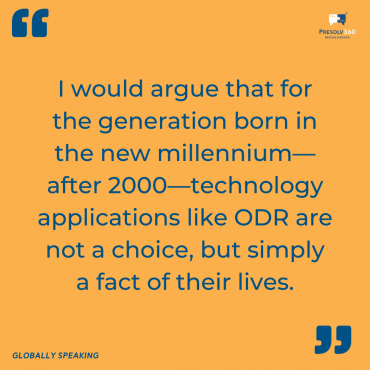
The oxymoron is that everyone loves to chat on the phone, and technology has become so commonplace now. But many people are still afraid whenever a new application of technology comes along. Concerns alleged about security, confidentiality, and the complexity of the technology scare them – so they withdraw.
So how can one overcome this? And particularly, what is your advice for young lawyers, or those starting their legal journeys in this space?
My advice is simply one word – educate. Most of the younger generation practically lives on computers and laptops. They move between programmes and devices like it is the most natural and easy thing in the world. So how can this generation become the ambassador of the movement to integrate this technology into law? Can they create seminars and other opportunities for employers to start understanding this?
In 2001, writer Marc Prensky coined the terms “digital native” and “digital immigrant” – broadly speaking, anyone born post-1980 is a digital native, while those born pre-1980 are digital immigrants. In the same vein, I would argue that for the generation born in the new millennium – after 2000 – technology applications like ODR are not a choice, but simply a fact of their lives.
We often think using technology is a matter of choice, but it is not. For example, most appliances in the modern home, at least in the West, cannot work without Wi-Fi. Some time ago, Munich Airport had issues with snapped internet cables, which grounded thousands of passengers across Germany. Without technology, it is now almost impossible to work. Technology is no longer a choice or something we can be prejudiced against. It is just there. The real question is how to make people comfortable with it.
Technology will take some jobs – it is inevitable. More jobs will need an understanding of how to use technology. If you don’t have it, you are likely going to be unemployed. That is something many people still don’t fully grasp. The problem is we do not always know how to best articulate complex systems in simple languages. However, you do not need detailed technical knowledge, such as how to write code or create software. Thanks to the rise of conversational AI and tools like ChatGPT, using innovative technology is as easy as typing a simple question or sentence. However, you still need some skills. You still need to know what to type in, and how to judge the accuracy of the response, right?
That is what I think will be the most important skill set for the lawyers of the future – demystifying technology, redesigning approaches and uses, and (re)training your brain to connect the dots in the right way so that you can use technology most effectively.
What role do you see for organizations like Presolv360 in this ODR-equipped future you described?
I honestly believe that these organizations are the only way ODR will become a part of the mainstream. Dedicated lobbying and persuasion of decision-makers in the corridors of power will drive this change, and such organizations will need to take the lead in this.
I know Presolv360 works with institutions like banks, and I see a lot of potential there to scale up. Many companies will need help with how to navigate this brave new world we find ourselves in, and they will rely on dynamic, young startups like Presolv360 for this guidance. The future is bright for these organizations.
Finally, law can be a tough profession even at the best of times, and all this change and uncertainty is bound to add additional stress to lawyers’ lives. What can lawyers do to take care of their mental health in such turbulent times?
Well, first, if you have chosen this profession, or if you want to pursue this career, you must accept that it is an incredibly competitive field. That is true not just in India but all around the world. So, if somebody asked me for advice before they entered this profession, I would likely do everything to persuade them otherwise. [laughs] But, if you are in this field, it is important to remember that managing your mental health is more important than success. So, find something that allows you to have an outlet for your stress.
Two, since the field is competitive, mediocrity is not an option. What can you do to get a leg up over your peers? It could be further studies, internships, travelling to understand the legal environment of various places, etc. These can be expensive, but if pursuing them opens more doors for you, it will be worth it eventually.
But, ultimately, remember that even if you do not pursue these extra avenues, you can still be successful if you put in the effort and hard work. ADR and ODR are going to change many parts of the legal field in the coming years, and learning the relevant skills and knowledge will keep you ahead of the curve. Stick to your strengths, and success will come.
As told to Ruhi Thakkar, a recent LLM [Comparative and International Dispute Resolution] graduate from Queen Mary University, London, and Head of Operations for India at ADR ODR International Ltd.

